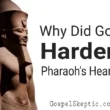How did you feel when you first read or heard that God hardened Pharaoh’s heart? Were you relaxed or perplexed, and did you bother to ask questions? If you did, what questions did you ask?
The question, “Why did God harden Pharaoh’s heart?” appears to be on the list of frequently asked questions having to do with God and the heart of Pharaoh. I asked the same questions again and again and was faced with the challenge of taking the answers the scriptures gave versus the ones that were given on behalf of God.
I should say that this could be a very challenging one. However, I know we can get through it and come out stronger, but it might not be easy, my friend. So get your mind ready, sit tight, and follow through as we get this boat moving.
Did God Harden Pharaoh’s Heart?
Sometime in the past, I found myself embroiled in the affairs of some sects of Christian theological ideas, and two of the challenging perspectives were those of the Calvinists and Arminians.
Initially, I thought it was a biblical matter, and still do to this day, but the nature of the situation was such that if you subscribe to a particular view of scripture, you will be identified with either of both groups on the main field. That was the situation I found myself in, and while I chose not to be addressed either as a Calvinist or an Arminian, I couldn’t hold back on what I read the scriptures saying.
Previous Read: Why There Ain’t No Rest For The Wicked
One of those areas was with God’s sovereignty and man’s free will. When it came to the Bible, the story of the Exodus, involving Yahweh God, Moses, and Pharaoh, as the main casts, was a frequent reference point for spicing up the discussion.
The reason why the story of the Exodus was a go-to was because it supposed that God did something to Pharaoh that could be described as a violation of his free will, which was a thing of concern for the Arminians, who appear to be the majority. The question, “Did God harden Pharaoh’s heart?” posed a vital problem for my Arminian friends to wrestle with, but why?
The reason was and is simply that the Bible says he did. But that wasn’t a problem for the Calvinists, considering their view and understanding of God’s sovereignty. Now, it feels like I’m making it about these two, so let’s move on.
But before we go further, let me point out that the main difference between the Calvinists and Arminians (as I understood it) is that the first places emphasis on the sovereignty of God and his will to man’s free will, while the latter emphasizes the free will of man in God’s sovereignty. But we’ve got to move on to the main question of this section.
Did God harden Pharaoh’s heart? Yes. According to the scriptures, God hardened his heart explicitly on six occasions (see Exodus 9:12, 10:1, 20, 27, 11:10, and 14:8) and implicitly on three occasions (see Exodus 7:13-14, 22, and 8:19). That is a total of nine times.
Meanwhile, much earlier, in Exodus 4:21, God informed Moses beforehand that he (God) would harden Pharaoh’s heart, and for that reason, he (Pharaoh) would not let the people of Israel go. A similar thing occurred in Exodus 7:3 and, lastly, in Exodus 14:4.
So yes, God did harden Pharaoh’s heart. But what does it mean for God to harden Pharaoh’s heart? There are different ways people get around this question. One would consider the character of the Pharaoh at the time, including his enslavement of the Israelites in Egypt and how he ordered the killing of the newborn male children of the Hebrews, according to the Bible. With that in mind, they conclude that Pharaoh was a hard-hearted man, and God’s hardening of his heart meant God gave him up to his hard-heartedness. That is to show that God did not violate his free will but showed respect for it.
Also, Exodus 8:15 shows that Pharaoh hardened his own heart, and more so, Exodus 8:32 shows the second time he did likewise. Then, in Exodus 9:34-35, it was not only written that Pharaoh hardened his heart, but that he and his servants did so. But in Exodus 10:1, God told Moses that he (God) was the one who hardened both the heart of Pharaoh and those of his servants.
So, the other view of what it means for God to harden Pharaoh’s heart is that God actively made Pharaoh act in disobedience to the word of the Lord. And while that appears to be God violating someone’s “free will,” there was a purpose for it. We will see why.
But if one thinks God didn’t do what the Bible says that he did, maybe the people who wrote the story got that part wrong and we have been misinformed. However, Proverbs 21:1 KJV says, “The king’s heart is in the hand of the LORD, as the rivers of water: he turneth it whithersoever he will.”
As The Lord Had Said
Let me take a minute and recap. The story we’ve been considering is about how the God of Israel delivered the Israelites from captivity in Egypt. Before the mass emigration recorded in the Bible, God chose Moses and communicated his mandate to him.
Take note of the following:
“Exodus 4:21 Yahweh said to Moses, ‘When you go back into Egypt, see that you do before Pharaoh all the wonders which I have put in your hand, but I will harden his heart and he will not let the people go.
Exodus 4:22 You shall tell Pharaoh, ‘Thus says Yahweh, Israel is my son, my firstborn,
Exodus 4:23 and I have said to you, ‘Let my son go, that he may serve me’; and you have refused to let him go. Behold, I will kill your son, your firstborn.’”
Now, when you consider the verses where it says that God hardened Pharaoh’s heart, Pharaoh hardened his heart, or that Pharaoh’s heart was hardened, one thing is common: the emphasis that the hardening happened as the Lord had said. Again, see Exodus 7:22, 8:19, and 9:12 and 35.
The idea takes us back to Exodus 4:21, where God determined to harden Pharaoh’s heart, noting that by doing so, Pharaoh will not let the people go. I mean the very people that he (God) commanded Pharaoh through Moses to let go so that they may serve him.
So often when the hardening happens, we are notified that it happened as the Lord had said, which to me is a reminder of what God told Moses that he will do in Exodus 4:21 and 7:22. But why? You may read the last verse mentioned for a clue.
Why Did God Harden Pharaoh’s Heart?
I listened to a Christian apologist who opined that the reason why God hardened Pharaoh’s heart was to make himself known to the Egyptians to lead to their salvation. My friend took on that opinion and related it to how God has now saved the Egyptians through faith in Christ Jesus.
While that might make some sense, I had to argue against that position because the narrative had nothing to do with God intending to save the Egyptians from anything. They were the ones who were punished for the enslavement and hardening that happened to Pharaoh. Moreover, it was the Israelites that God intended to set free from Egypt and for himself.
The point that stands appears to be that God intended to use Pharaoh to make his name known abroad. Take, for instance, Exodus 9. God had brought death on the carmels of the Egyptians and boils upon man and beasts because Pharaoh refused to let the people go, and that was after it said God hardened his heart.
“Exodus 9:12 And the LORD hardened the heart of Pharaoh, and he hearkened not unto them; as the LORD had spoken unto Moses.
Exodus 9:13 And the LORD said unto Moses, Rise up early in the morning, and stand before Pharaoh, and say unto him, Thus saith the LORD God of the Hebrews, Let my people go, that they may serve me.
Exodus 9:14 For I will at this time send all my plagues upon thine heart, and upon thy servants, and upon thy people; that thou mayest know that there is none like me in all the earth.
Exodus 9:15 For now I will stretch out my hand, that I may smite thee and thy people with pestilence; and thou shalt be cut off from the earth.
Exodus 9:16 And in very deed for this cause have I raised thee up, for to shew in thee my power; and that my name may be declared throughout all the earth.
Exodus 9:17 As yet exaltest thou thyself against my people, that thou wilt not let them go?”
If you read Romans 9, you will see that Paul quotes Exodus 9:14 in verse 17 to make a point about God choosing to do as he pleases, but there you have him finding fault with Pharaoh in verse 17 of Exodus 9. Sounds like someone doing something they intended to do and looking for someone else to blame for their actions. It’s more like a justification for being the vengeful character towards some (the Egyptians) and merciful towards others (the Israelites), as depicted in the narrative. All that was by his own choosing.
Why did God harden Pharaoh’s heart? Let me share six reasons why God hardened Pharaoh’s heart with you, according to the scriptures.
1. The first reason was to make Pharaoh not give in and let the people of God go at the time. (See Exodus 4:21, 10:27.)
2. The second reason was so God could multiply his signs and wonders in the land of Egypt by bringing more plagues on the Egyptians. (See Exodus 7:22, 12:9.)
3. To kill Pharaoh’s first son and all the firstborn of the Egyptians, including those of the maidservants and animals. (See Exodus 4:21-23 and 12:4-7.)
4. To make Pharaoh go against the Israelites after he allowed them to go. (See Exodus 14:4, 8, and 9.)
5. To bring destruction on Pharaoh and the Egyptians that were with him and honor God’s name; therefore, God also hardened the hearts of the Egyptians. (See Exodus 14:17 and 26-28.)
6. God hardened Pharaoh’s heart to make himself known to the Egyptians as the Lord, to show forth his power, and to make his name declared in all the earth. (See Exodus 9:16, 7:5, 14:18.)
Exodus 7:5 KJV says, “And the Egyptians shall know that I am the LORD, when I stretch forth mine hand upon Egypt, and bring out the children of Israel from among them.”
I once asked a good friend of mine, who held to the view that God hardened Pharaoh’s heart because Pharaoh was already a hard-hearted man, “Why did God have to harden his heart to begin with?” more so that he did it on different occasions, until the destruction of Pharaoh and all his hosts and chariots. The young man was uncertain and said he would consider the question.
Well, it seems Pharaoh could have let the people go after some pressurization, but God had a plan and a series of events he wanted to use to demonstrate his supremacy in the land of Egypt, so he had to keep their leader, Pharaoh, under his influence and control. (See Exodus 10:24-27.)
For instance, in Exodus 10, when God brought locusts upon the land, it was so grievous that Pharaoh sent for Moses and Aaron in haste, confessed his sins against them and the Lord their God, and asked for their forgiveness. He further requested that they pray to God to take the death from him, which they did.
“And the LORD turned a mighty strong west wind, which took away the locusts, and cast them into the Red sea; there remained not one locust in all the coasts of Egypt,” Exodus 10:19 KJV.
Thank God! But what happened next? Exodus 10:20 KJV says, “But the LORD hardened Pharaoh’s heart, so that he would not let the children of Israel go.” Isn’t this frustrating already? Hold on! That wasn’t all.
In the very next verse, God directed Moses on what to do to bring great darkness upon the land of Egypt, the kind of darkness that people could feel. Moses did as God commanded, and thick darkness rested on the land of Egypt for three days. The darkness was such that no one but the Israelites could see one another because they had light in their dwellings. Interesting, isn’t it?
“Exodus 10:24 KJV And Pharaoh called unto Moses, and said, Go ye, serve the LORD; only let your flocks and your herds be stayed: let your little ones also go with you.
Exodus 10:25 KJV And Moses said, Thou must give us also sacrifices and burnt offerings, that we may sacrifice unto the LORD our God.
Exodus 10:26 KJV Our cattle also shall go with us; there shall not an hoof be left behind; for thereof must we take to serve the LORD our God; and we know not with what we must serve the LORD, until we come thither.”
Many don’t notice how demanding Moses was here, as well as Pharaoh’s willingness to let the people go, or do people ignore that? Well, as you can imagine, “God allowed him to choose to not let the people go.” I wish that was what the scripture said, seeing that he was already offering to let them go.
What did the scripture say? It says, “But the LORD hardened Pharaoh’s heart, and he would not let them go,” Exodus 10:27 KJV. So Pharaoh dismissed Moses and told him not to see his face again or face death for doing so. But why was he enraged at Moses?
Someone also said that God hardened Pharaoh’s heart to bring about redemption. Indeed, there was redemption for the Israelites in Egypt, though they didn’t even want to leave Egypt. The Israelites were even murmuring on the way out of Egypt how they loved Egypt and wanted to remain there.
“Exodus 14:11 KJV And they said unto Moses, Because there were no graves in Egypt, hast thou taken us away to die in the wilderness? wherefore hast thou dealt thus with us, to carry us forth out of Egypt?
Exodus 14:12 KJV Is not this the word that we did tell thee in Egypt, saying, Let us alone, that we may serve the Egyptians? For it had been better for us to serve the Egyptians, than that we should die in the wilderness.”
It sounds like they were not having a very bad time in Egypt, or why would they be okay staying there when they were told of God’s redemption? Hardness of the heart? It seems some, if not most, of those people had to leave Egypt against their own will. My goodness! To even think that God was doing great works in their midst and yet, they were still interested in staying in Egypt. Maybe it wasn’t really about those people but God’s covenant and what he foresaw that he would have to do, or what he (God) willed to do.
You will hear that God was merciful to the Egyptians. May I bring to your knowledge again what God said to Moses in Exodus 4:21 and 23? God told Moses beforehand that he will kill the firstborn son of Pharaoh. Do you know when that happened? It happened before Pharaoh let the people go. Wasn’t it meant to be? Read the tenth plague.
Perhaps God was merciful to the Egyptians by deleting all their firstborns because Pharaoh ordered the killing of the newborn males of the Hebrews at a particular time, as some say in his defense. Was it mercy or vengeance? Please help me out.
Also Read: When God Messed Up As Me.
One would think that an all-knowing, all-powerful, and all-loving God could have emigrated his chosen people from Egypt without hurting a fly and still demonstrated their greatness in such a way that people would gladly run to his feet and bow in worship. But they chose to move in such a destructive and tribalistic way to save some and destroy others; that is telling on their character.
You can believe in this God if you want to. But I don’t think it’s fair to demand that everyone else does so, regardless of what character you’re appealing to. Let people think and decide for themselves, and hopefully, God doesn’t harden their hearts to bring destruction upon them. I’m overwhelmed by these things, and so, I say to you, What a mighty God we serve!








